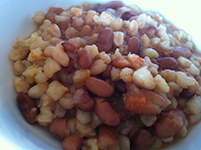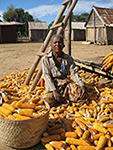Resource 1: Healthy living practices
![]() Background information / subject knowledge for teacher
Background information / subject knowledge for teacher
The following information is useful for different topics associated with healthy living. Use this as a resource for designing activities and guiding discussions.
Types of food
It is important to eat and, if possible, to eat a balanced diet. Foods can be grouped in many different ways and here is one that is commonly used in Africa. It lists four basic food groups, and each one helps us in a different way:
- Grains – this includes food like bread, rice, maize and fufu. Eating these gives us the energy to do physical work. Grains, which are carbohydrates give us energy.
- Fruits and vegetables – these are important because they give us the vitamins and minerals we need to be healthy. Eating them helps us stop getting ill.
- Meat, chicken, fish, eggs, beans and nuts – all these have protein in them. Protein helps build muscles. You need protein to grow big and strong.
- Dairy foods – this includes milk, cheese, and yogurt. These types of food have a lot of calcium. Calcium is important because it helps build strong bones and teeth.
Eating a mixture of these foods gives us good nutrition. Eating only one of these things every day can cause health problems. However, some food is better than no food.
Many children like to eat sweets and sugar. This is fine in small amounts, as it gives us energy. But too much sugar is bad for the teeth because it can cause tooth decay. Too much sugar can also make us fat.
 Original source: Jon Mountjoy via https://www.flickr.com/ photos/ mountjoy/ 5182202725/ |  Original source: 'Woodlouse' via https://www.flickr.com/ photos/ woodlouse/ 3964189738/ |
Keeping food safe
To keep food safe, there are a number of things you need to think about.
Firstly, foods can go bad or rot. These include most vegetables, fish and meat, but some take longer to go bad than others. They go rotten when they have been left alone too long. When they rot, they start to smell awful, and if you eat them they can make you sick.
To stop fresh food from rotting, it is good to keep it as cool and dry as possible. Another way to stop fresh food rotting is to preserve it. This involves drying the meat, fish or vegetable either in the hot sun or over a fire.
Secondly, some food, especially food in cans, can go bad if it is kept too long and not stored properly.
Thirdly, some food, especially meat, can make us sick if it is cooked once and then heated up again but not reheated thoroughly. It is best to only cook what you are going to eat on that day. If you do heat up cooked food, make sure it is thoroughly heated through.
Finally, animals including many insects also like food, but if they touch our food they leave germs that can give us diseases and illnesses. Try and keep your food covered up. If you have a box or container to keep it in, this is best.
Why we clean our surroundings
We clean our surroundings to protect us from dirt and diseases. People can get ill from coming into contact with many different things. These include:
- animals and insects;
- rotting food;
- rubbish;
- animal and human faeces;
- chemicals;
- dirty clothes.
For this reason, it is good to clear these things away from where we live, eat or sleep. You can do this easily by cleaning your surroundings every day and collecting the rubbish and dirt in one place away from where you stay.
Good hygiene practices
There are many kinds of good hygiene practices you can do every day. The reasons for these are to keep us clean and to protect us from picking up illnesses.
Some good practices include:
- washing ourselves every day if possible;
- cleaning our teeth every day if possible ;
- washing our hands before eating or cooking;
- washing our hands after going to the toilet;
- keeping our house, clothes and surroundings as clean as possible;
- not going to the toilet near the house or kitchen;
- not leaving food lying around in the open.
The best kinds of exercise
Any regular exercise is a good thing, but it is always good to try and make it a habit.
The sorts of exercise that you can do regularly include:
- walking or running to school;
- playing games, e.g. football;
- swimming;
- working in the field;
- housework.
It is important to try and do some exercise every day, because it helps build up your muscles, your heart, and your overall fitness. If you don’t exercise regularly, you will find it more difficult when you try to. You will feel weak and short of breath.
3. Using local resource people



